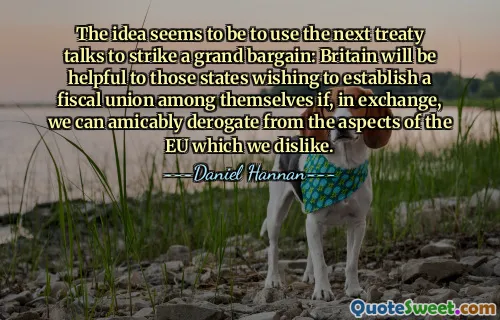
The idea seems to be to use the next treaty talks to strike a grand bargain: Britain will be helpful to those states wishing to establish a fiscal union among themselves if, in exchange, we can amicably derogate from the aspects of the EU which we dislike.
This quote highlights a strategic approach within the European Union, where individual member states, like Britain, aim to leverage their influence during upcoming treaty negotiations. The proposition is to form a significant sort of compromise: Britain offers support to certain countries pushing for deeper fiscal integration. In return, Britain seeks to diminish or remove certain EU policies or regulations it finds objectionable. Such negotiations embody the complexities of multilateral diplomacy, especially within a union of sovereign nations with diverse interests. The concept behind this negotiation suggests that countries are willing to make calculated concessions if they can curtail or alter the parts of the EU structure that they perceive as restrictive or problematic. This reflects a broader trend of balancing national sovereignty with collective unity. The approach underscores considerations of financial stability, political influence, and national autonomy, making it a nuanced dance of mutual interests. The quote resonates with ongoing debates about EU reforms, sovereignty, and the future direction of European integration, especially in the context of Brexit and the reshaping of Britain’s relationship with the continent. It exemplifies pragmatic diplomacy where strategic alliances are built around common goals, often at the expense of some shared standards or policies, to achieve a more favorable position for individual nations. Ultimately, it reveals how alliance-building in international politics often involves trade-offs, negotiations, and calculated compromises to serve national interests while participating in collective decision-making bodies.











